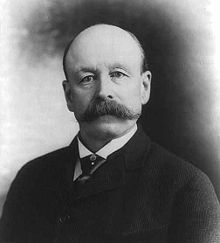Frederic T. Greenhalge
| Frederic Thomas Greenhalge | |
|---|---|
 |
|
| 38th Governor of Massachusetts | |
|
In office January 4, 1894 – March 5, 1896 |
|
| Lieutenant | Roger Wolcott |
| Preceded by | William E. Russell |
| Succeeded by | Roger Wolcott |
| Member of the U.S. House of Representatives from Massachusetts's 8th district |
|
|
In office March 4, 1889 – March 3, 1891 |
|
| Preceded by | Charles Herbert Allen |
| Succeeded by | Moses T. Stevens |
| Mayor of Lowell, Massachusetts | |
|
In office 1880–1881 |
|
| Member of the Massachusetts House of Representatives | |
|
In office 1885 |
|
| Personal details | |
| Born |
Frederic Thomas Greenhalg July 19, 1842 Clitheroe, England |
| Died | March 5, 1896 (aged 53) Lowell, Massachusetts |
| Political party | Republican |
| Signature | |
Frederic Thomas Greenhalge (born Greenhalgh) (July 19, 1842 – March 5, 1896) was a British-born lawyer and politician in the United States state of Massachusetts. He served in the United States House of Representatives and was the state's 38th governor. He was elected three consecutive times, but died early in his third term. He was the state's first foreign-born governor.
Frederic Thomas Greenhalge was born in Clitheroe, Lancashire, England on July 19, 1842, to William Greenhalgh and Jane (Slater) Greenhalgh. He was the only son (of seven children). His father, the supervisor of a printing operation, was descended from the Greenhalghs, a family of longstanding note in Lancashire. The family moved first to Eshton and then Edenfield, where the young Greenhalge (who would change the spelling of his name as an adult) attended private school. In 1855 the family immigrated to Lowell, Massachusetts, where the father had been offered a job heading the printing department of the Merrimack Manufacturing Company.
Greenhalge attended the public schools of Lowell, where he excelled academically and participated in debating societies. In 1859, he enrolled in Harvard College, where he was a member of the Institute of 1770 and was well regarded as a debater. He left Harvard after three years because his father died, the family finances having suffered a setback due mill closures caused by the American Civil War. He briefly taught school in Chelmsford, Massachusetts and studied law. In 1863, he sought to enlist in the Union Army, but was rejected on account of poor health. He instead secured a civilian job work as a commissary for the army at New Bern, North Carolina. There he contracted malaria, and was sent home in April 1864. He resumed his study of the law, was admitted to the bar in Lowell in 1865.
...
Wikipedia
